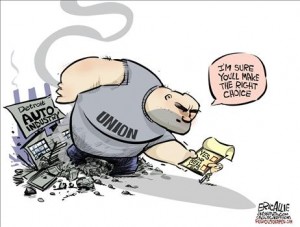Webb Won’t Support Card Check
 Ezra Klein passes along word that “James Webb, it seems, will not be supporting the Employee Free Choice Act, and won’t even say if he’d support efforts to break a filibuster and let it get to the floor for a vote. That’s a significant blow to EFCA, and something of a surprise given Webb’s carefully cultivated image as an economic populist.”
Ezra Klein passes along word that “James Webb, it seems, will not be supporting the Employee Free Choice Act, and won’t even say if he’d support efforts to break a filibuster and let it get to the floor for a vote. That’s a significant blow to EFCA, and something of a surprise given Webb’s carefully cultivated image as an economic populist.”
To which I commented, “Maybe because EFCA is spectacularly misnamed? Taking away secret ballots and thereby allowing union organizers to bully workers into signing up isn’t exactly what the masses are clamoring for.” In less than two minutes, I was met with the rejoinder from commenter Steve LaBonne, “Fallout from yet another messaging war lost by the inept Democrats (as the wide prevalence of the kinds of lies retailed by Joyner indicates.)”
Um . . . no.
The essence of EFCA, as is obvious from a quick read of the bill, is that it allows formation of a union automatically simply by having a majority of employees sign cards saying they want a union. The big change here is that it now happens WITHOUT AN ELECTION SUPERVISED BY NLRB.
The Big Labor rationale is that elections can be preceded by pressure from the employer. Fine. Target egregious behavior on the part of employers. But bypassing elections by definition means that there is no balloting, secret or otherwise. Instead, workers are offered cards to sign and are intimidated into signing them. People are naturally afraid to be singled out and will go along with the flow rather than take a stand.
Commenter Pesto adds that, “unions get organized by workers and recognized by bosses all the time without Board elections. It’s been perfectly legal to do it that way since the Wagner Act passed. The only change WRT to majority signup in the Employee Free Choice Act is that it would be workers who would get to choose between majority signup and a Board election, rather than the boss choosing for them, which is the way it works now.”
But that’s hardly an insignificant change! It removes the one safeguard that employers and workers who wish to retain their independence in negotiating their working conditions have.
Instead of a private election with a secret ballot overseen by an impartial federal board, union organizers would simply need to gather signatures from more than 50% of the employees in a workplace or bargaining unit, a system known as “card-check.” There are many documented cases where workers have been pressured, harassed, tricked and intimidated into signing cards that have led to mandatory payment of dues.
Under EFCA, workers could lose the freedom to express their will in private, the right to make a decision without anyone peering over their shoulder, free from fear of reprisal.
So, again, outlaw worker intimidation by employers. Don’t fight it by simply changing the party intimidating the workers. Let workers vote. In secret.






Please site evidence. I worked for years at a union shop in a right-to-work state and I can tell you that the unions were in no position to “intimidate” anyone.
In our workplace, membership was only about 14%. When new hires came on board I know that union women (yes,in my shop, the union was dominated by broads) gave the pitch. If people declined to sign up, they were left alone.
Everyone in our shop was covered by the bargaining agreement and was entitled to a grievance procedure in the event of a dispute with management. Non-members, however, did not have access to union resources as the procedures commenced.
Interestingly, non-member grievances were settled in accordance with management in a majority of the cases; whereas union members were much more likely to come out on top–given the fact that they had access to union staff & lawyers as they went through the process.
When I started my job, I didn’t join; but after being there a year or so, I started paying dues because I saw their effectiveness in representing worker interest.
The idea that unions “intimidate” people into joining is something uninformed critics pull out of their rear from watching too many mobster films.
Good to see this on print as we all can learn a little. But I am curious, under the current system, if a majority signed for union creation- what happens next? An election? And if an election negates the majority signed cards- what does that tell you? A campaign by the corporation to nullify the will of the majority? So at the end of the day, the argument centers around who gets the power to bully and we see, as your critic semi-noted, which side you take.
You whined about being the target of a fallacious ad hominem argument in Ezra Klein’s comments, but apparently you don’t have any problem with using arguments from authority yourself. What does McGovern’s opinion have to do with anything? Maybe he’s wrong. His WSJ editorial certainly doesn’t cite any surveys or other facts, like Pesto linked to in Ezra’s thread.
Ad hominem is always an argumentative fallacy; citing authority isn’t. The point of citing McGovern isn’t that he’s an authority on labor relations but that he’s a famous liberal whose sympathies with organized labor are well known.
election?
Yes.
It tells you the will of the majority as best we can measure. If people didn’t have the right of secret ballots in political elections, almost no one would vote against the tide in a heavily one-party district.
And that might be the norm. But a union organizing election could well be different, as there’s pressure to join. Once the union is there, there’s much less incentive for pressure.
There’s plenty of real world examples of unions using strong arm tactics, even violence, in labor disputes. Beyond that, though, having to face down a union organizer and say No is itself intimidating in a way that making the decision in a secret election isn’t.
Why are unions and their supporters afraid of the secret ballot?? If employers are able to intimidate workers into voting a certain way, secret ballots prevent anyone from knowing who voted for what. Is it that people on the left and unions in general just do not believe in liberty? Was the Soviet Union the ultimate union? Why is it you want to force you will on others? Does not the Constitution provide protection of the rights of the minority from the will of the majority? I am tired of the BS, it is getting to be time for a fight.
@JJ
Sure there are James. But there’re also many examples of businesses engaging in union busting or employing strike breaking goons to beat the shit out of strikers. Not sure how far examples of bad behavior on both sides gets us in this debate.
Citing McGovern seems entirely valid in this context.
I could not be in greater agreement with your well written post. The answer to employer’s ability to apply pressure is not to counter by providing unions with ability to apply pressure. That leaves the worker in the middle, pressure from both sides. The answer is to remove the employer’s ability to apply pressure.
I would still like to see an actual example when it comes to organizing efforts. Most of the union organizers I’ve met are scrawny leftie Yale grads who would likely get beat up by Clara Peller.
I think a look at the data compiled by the National Labor Relations Board is instructive, since J-Dawg thinks things are peachy.
Both employers and unions are subject to regulations surrounding organizing and the NLRB mediates disputes.
In 2007 there were 22,331 unfair labor practices cases filed–72% of which were filed against employers and 23% against unions.
Of the complaints issued by the NLRB’s administrative judges, 88% ruled against employers and 10% ruled against unions.
The complaints and rulings are not limited to representation, but the stats indicate that management is found to violate more often than unions in proportion to the number of complaints filed.
http://www.nlrb.gov/nlrb/shared_files/brochures/Annual%20Reports/Entire2007Annual.pdf
Could one of the resident lefties explain why a secret ballot doesn’t remove employer as well as union pressure?
Opponents of secret ballots, publishing comments anonymously at American Prospect. Classic.
I’m not personally a Webb fan, but I’ve read Born Fighting. He characterizes unionization as at odds with the fierce individualism of the Scots-Irish. I’m not surprised that he (a) places little value in unionization or (b) that his view of the working man is at significant odds with the frail image being communicated in the comment thread at American Prospect.
First of all, as I said before, the whole claim that there is overwhelming “union pressure” is way overblown.
Nevertheless, lets walk you through how organizing works in practice.
A worker feels they are being mistreated and thinks a union is a good idea. The union will not likely pour resources into a campaign that they have no chance of winning. Thus, the local organizer will make sure there is a critical mass of workers seeking representation. If it is just one neer-do-well complaining to the union about management, they are not going to launch a campaign.
If the worker can persuade the union to launch an organizing campaign, they then need to get 30%+1 of the bargaining unit to sign cards saying they want representation in order to force an election.
Usually this entails the core group of local workers going around asking they co-workers to sign. Unless its a really big site, there won’t be more than a single organizer or two (who also have other union duties).
If you face a hostile employer, they find out pretty quickly that there is an organizing campaign going on and there are thousands of ways to subtly put the kibosh on the campaign (e.g. transfer the leaders to another unit, fire them, buy them off, tell workers the operation will shut down, etc.. there are professional consultants who get paid a lot of cash to wage this type of counter-insurgency).
IN a labor market where the supply outpaces the demand, workers are in a consistent state of insecurity. These tactics really work.
What does the union have at its disposal? Not much, honestly. They don’t have teams of thugs to go around and force people to sign cards. They really only have the power or making a case.
Workers are not dumb. They see the choice of pissing off the boss and getting fired or pissing off some skinny Yale hipster and they choose to not pissing off the boss and put up with their conditions.
What are the options if you get fired whilst organizing? J-Dawg says “outlaw employer intimidation.” Well, it is outlawed. But to seek redress you can’t get all George Bush and ignore the country’s laws and procedures. You have to file a complaint with the NLRB. You have to go to hearings. If you want to win, you have to retain legal counsel. All of which is happening while you don’t have a job.
There are appeals processes which employers use to prolong the procedure. If you look at the NLRB stats, most complaints get resolved before they go through their entire course of appeals. Most of these agreements are probably one-time payoffs to the worker with no right of reinstatement.
Bottom line–employers have the power in the employee/worker relationship and have comparatively unlimited resources.
Having a simple 50% +1 card check would go a long way towards minimizing these advantages.
Triumph, While you make some good points I still don’t see why there still shouldn’t be a secret ballot. If it’s too hard – too many roadblocks to organizing enough people to setup an election why advocate getting rid of the secret ballot instead of advocating to makee it easier to get to the point where there is an election?
What is it that you see as being inherently wrong with a secret ballot?
Triumph: well stated- and this is what card check is all about – balancing the power which is overwhelmingly on one side and routinely abused- in other words- what we have now does not work. If one is against unions then say so and even argue about outlawing them or having “right to work” law like VA, but do not claim for a second that the current system works because it is democratically motivated – it make one looks churlish.
I may have posted this already, and if I did, I apologize. But re workers and management, there’s a story that Saul Alinksy used to tell.
Seems there was a strike. After much too and fro, the union and management forged an agreement. But for the agreement to take effect, the union vote had to be 100%. Everyone signed on except one guy who held out. His fellow workers tried convince him to sign on. No go. His union shop steward tried. No go. They got his wife to put pressure on him. No go. Finally, the president of the company called the guy into his office and said, “If you don’t sign this agreement right now, you’re fired.” The guy signed straightaway.
The president said, “What’s up with this? Your fellow workers, your shop steward, you wife–none of them could get you sign. I talk to you for one minute, and you sign on the spot. What gives?”
The guy says, “Well you see sir, before I talked to you, nobody had explained it to me.”
There is nothing inherently wrong with a secret ballot. The proposed legislation still allows for secret ballot elections if the workers want one and the positions of a majority of the bargaining unit are in doubt.
The problem–as I indicated above–is that getting to an election is extremely difficult in many cases due to the ability of employers to dictate the process.
The 50% card check rule simply makes the process more neutral.